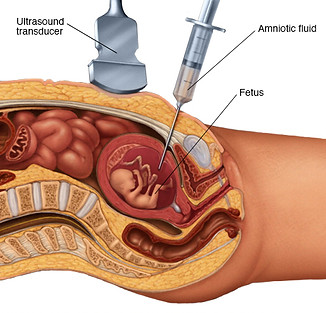
GENETICS
SCIENCE & SOCIETY
Genetic Disorders
Down's Syndrome
Down's Syndrome is a genetic condition that's caused when someone has an extra copy of chromosome 21. Each person with Down's Syndrome is unique and will possess different characteristics to varying degrees.
Characteristics
Physical differences such as slanted eyes, low muscle tone, small mouths, and a crease across the palm.
Health problems such as heart disorders, Hypothyroidism, hearing and vision impairment.
Intellectual impairments can occur sometimes on a minor level only or more severely. Often children reach the same milestones, they just take longer to get there.
Statistics
There are over 60 000 people in the UK who have Down's Syndrome.
In the 1950s, children born with Down's Syndrome only had a 25% chance of surviving their first year.
Today most people live until their 60s, the oldest person with Down's Syndrome is Kenny Cridge who just celebrated his 78th Birthday!
Genetic Testing
Fetal testing for Down's Syndrome is extremely common in the UK with 800 000 tests carried out annually. The most common test is the combined risk test which combines the scores from the following parameters:
The Mothers age
HCG levels in blood
PAPP-A levels in blood
Measurement of Nuchal Translucency
The combined test cannot tell you for certain whether the foetus has Down's syndrome but it can tell you how likely it is. If a foetus is given a high score the parents may choose to undergo further testing such as amniocentesis or chorionic villus sampling (CVS). Amniocentesis is done by inserting a needle into the uterus and taking a small sample of amniotic fluid that then gets sent to a laboratory for testing. See example below:

How Much Does
Age Matter?

The age a mother gets pregnant is commonly debated when it comes to the likelihood of a child being born with Down's Syndrome. Studies have found that if a mother conceives at 35, her chance of having a child with Down's Syndrome is 1 in 350. Those numbers are largely reduced to 1 in 50 when the mother is 45, meaning the mother's age can be a significant factor.
Amniocentesis vs CVS?
Similarly to amniocentesis, CVS is invasive and involves inserting a needle. The needle will take a small amount of placenta that will get sent to a laboratory for testing. The placenta contains genetically identical tissue to the baby which will allow the doctors to identify abnormalities such as Down's Syndrome. Both tests carry a small risk of miscarriage due to injury during the procedure or infection. The chances of miscarrying are approximately 1 in 100 for both tests.
Other Genetic Disorders

Cystic Fibrosis
Cystic Fibrosis causes a build-up of mucus in the lungs and digestive system which causes difficulty breathing and problems digesting food. The mucus will also block the pancreas which means essential nutrients aren't absorbed into the body either. Testing for Cystic fibrosis is usually done at birth as part of the generic heel prick test done on newborns. If something comes up further genetic testing is done to confirm it.

Huntington's Diease
Huntington's Disease is a result of faulty genes which are supposed to tell your bodies cells what to do but can't. As a result, parts of the brain stop working and over time the bodies central nervous system becomes increasingly affected. Control of the limbs can become difficult, memory and speech problems are also common. If a parent has Huntington's there is 50% chance that it will get passed onto their children.

Marfan Syndrome
Marfan Syndrome is a disorder which affects connective tissue in the body. Connective tissue is important for proper growth and development and is made up of a protein called fibrillin-1. When the gene that tells the body how to make fibrillin-1 doesn't work, the body creates too many proteins and Marfan Syndrome is caused. People will the syndrome tend to have longer limbs as well as heart, eye and lung problems.
Want to Learn More?
The genetic disorders covered on this page are some of the most common disorders currently affecting people in the UK, however, it's by no means an exhaustive list. There are many kinds of genetic disorders that exist, some rarer than others, if you'd like to read about ones we haven't covered on this page then please click here.